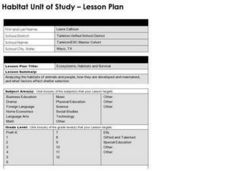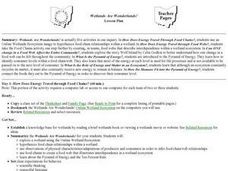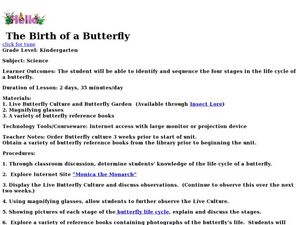Curated OER
A Turning Point in the Space Shuttle Program
Students study about the Columbia crew and their mission, how space shuttles work, and explore the history of the shuttle program. By accessing many websites imbedded in this plan, students gain a deep understanding of the Space Shuttle...
Curated OER
Dino Hunt
Students use the Internet to gather information about dinosaurs. They practice navagating through the different websites. They also practice listening to directions and also explore how to fill out a KWL chart.
Curated OER
Fod Pyramid
Sixth graders investigate the Food Pyramid and how it relates to their own diet. They conduct Internet research, complete the "Rate Your Plate" online activity, and create a HyperStudio presentation.
Curated OER
all About the States
Students conduct Internet research about the states and use educational software to graphically organize the facts they have studied. As a class, students create posters and bulletin boards of the 50 states.
Alabama Learning Exchange
Mars Metal Rover
Middle schoolers examine the properties of metal that can be used on the surface of Mars. They research the Internet to determine the properties of Mars and determine which metals are compatible. They create a slide show presentation of...
Curated OER
Save Our Forests
Fifth graders discuss the forest products industry and its affects upon their communities. They inventory the wood and paper products they consume and determine how it translates into the number of trees cut. Using a spreadsheet, they...
Curated OER
Ecosystems, Habitats and Survival
Students analyze the habitats of animals and people, how they are developed and maintained, and what factors affect shelter selection. They create a classified ad that describes a specific animal's habitat.
Curated OER
Coastal Landforms
Students explore landforms. Using the internet, students research the main landforms. They define landforms and download images into a word document. Students create their own picture-dictionary.
Curated OER
The Gods of Ancient Egypt
Eighth graders research Ancient Egyptian gods and their functions. Using the internet, 8th graders explore Ancient Egyptian history. Using computer technology (Photo Story or PowerPoint), students create a presentation. They explain...
Curated OER
Researching Plant Life
Fourth graders examine the process of photosynthesis. Given websites about plant life, 4th graders retrieve and record accurate information about the parts of the plant and photosynthesis. Students solve a "Plant Life Mystery" from...
Curated OER
The Microscope
Students investigate the parts and functions of a compound microscope. They explore various websites, label the parts of a microscope on a worksheet, view prepared slides, and create drawings of the prepared slides.
Curated OER
Online Words
Students use an online dictionary to discover the meaning of vocabulary words. The use of the internet is a skill that is developed for the integration of technology into the curriculum.
Curated OER
Wetlands Are Wonderlands!
Students explore the wetlands. They participate in numerous activities to explore food chains, food webs, and energy in the ecosystem. Students read stories, sing songs, visit specified websites, and participate in games to discover...
Curated OER
Where in the World is Flat Stanley?
Second graders analyze the proper form of a friendly letter and send flat Stanley letters all over the United States. In this letter writing lesson plan, 2nd graders read the book Flat Stanley by Jeff Brown and create their own Flat...
Curated OER
Traveling on the Orphan Train
Young scholars explore the components and meaning of philanthropy. In this community awareness lesson plan, students are able to identify and research agencies and organizations that provide services to children in need, compare and...
Curated OER
Probability - What Are the Odds?
Students study the concept of probability. In this probability lesson, students define probability and visit an interactive spinner website to learn about theoretical and experimental probability. Students use pennies and work in pairs...
Curated OER
Who Am I?
High schoolers explore study different mathematicians. In this mathematician lesson, students research twelve mathematicians. High schoolers question one another to guess who their mathematician is. Students create a timeline of big...
Curated OER
Weather Watchers
Students watch the weather. In this science observation instructional activity, students collect data regarding the local weather and create their own weather forecasting video.
Curated OER
Cryptid Zoo
Learners explore cryptids. For this story writing and technology lesson, students define "cryptid," write a short script, and draw an illustration for an imaginary animal character. Learners read their script aloud into a microphone and...
Curated OER
All Aboard: Underground Railroad Knowledge Chart
Fifth graders research the Underground Railroad. In this Underground Railroad lesson, 5th graders start a KWL chart about the Underground Railroad. Students use a map to locate slavery areas and free states. Students view a PowerPoint...
Curated OER
The Birth of a Butterfly
Students explore the life cycle of a butterfly. In this butterfly lesson, students visit Internet websites, observe a live butterfly culture, and examine pictures of the stages of the butterfly life cycle in order to independently...
Curated OER
Waterworks
Students investigate the water quality of a river. In this water quality lesson plan, students use microscopes, probing devices, and global positioning systems to determine water quality and create presentations on it.
Curated OER
The Electric Guitar: Then and Now
Students study the history of the electric guitar. In this electric guitar lesson, students use print and Internet sources to research the history of the electric guitar. Students use their research findings to create PowerPoint...
Curated OER
Observations From the Past
Ninth graders explore direct and indirect evidence. In this astronomy activity, 9th graders investigate the contribution of early astronomers to their field. They create a model of the solar system.

























